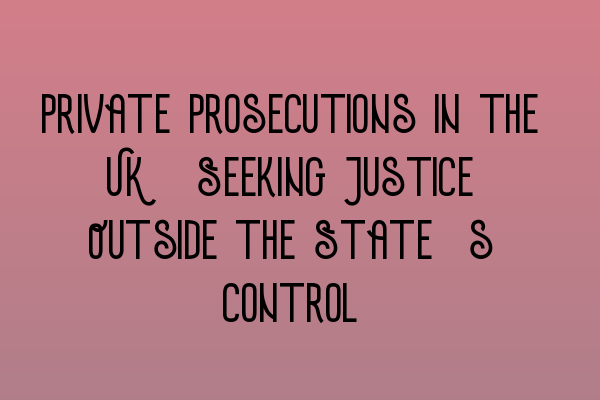Private Prosecutions in the UK: Seeking Justice Outside the State’s Control
Private prosecutions can be a powerful tool for seeking justice in the UK when the State is unable or unwilling to take direct action. In this blog post, we will explore the concept of private prosecutions, their legal framework, and how they can play a crucial role in ensuring justice is served.
What is a Private Prosecution?
A private prosecution is a legal proceeding initiated by an individual or entity, known as the private prosecutor, instead of by a public prosecuting authority. It allows individuals to bring criminal charges against defendants for alleged offenses. Private prosecutions can be pursued for a wide range of criminal acts, from fraud and theft to assault and harassment.
Private prosecutions are possible under the common law in the UK and are governed by the Prosecution of Offences Act 1985. While the state usually handles criminal proceedings, private prosecutions offer an alternative route for individuals who feel that the state’s response might not be adequate or timely.
Benefits of Private Prosecutions
Private prosecutions offer several advantages for individuals seeking justice:
- Justice: Private prosecutions allow victims to take control of their case and seek justice on their own terms. This can be especially beneficial in cases where public prosecuting authorities may have limited resources or conflicting priorities.
- Timing: Private prosecutions can often be initiated more quickly than state prosecutions, ensuring that justice is not delayed. This can be particularly crucial when urgent action is required to protect the rights and interests of the victim.
- Accountability: By initiating a private prosecution, victims can hold individuals or organizations accountable for their actions, even if the state has not taken action. This can send a strong message that wrongdoing will not go unpunished.
- Flexibility: Private prosecutions offer flexibility in terms of evidence gathering and legal strategy. The private prosecutor can choose their legal team and build a case tailored to their specific circumstances.
Legal Requirements for Private Prosecutions
Before initiating a private prosecution, it is essential to meet certain legal requirements:
- Evidential Test: The private prosecutor must have sufficient evidence to demonstrate that there is a realistic prospect of conviction. This evidential test ensures that private prosecutions are not pursued based on frivolous or unfounded allegations.
- Public Interest: The private prosecution must also be in the public interest. The interests of the victim, as well as the wider community, must be considered. Private prosecutions that serve only personal vendettas or unrelated motives are unlikely to meet this requirement.
- Crown Prosecution Service (CPS) Consent: In some cases, the private prosecutor must seek the consent of the Crown Prosecution Service (CPS) before initiating a private prosecution. This ensures that the state can intervene if it believes the case should be handled by a public prosecuting authority.
It is crucial to seek legal advice from a qualified criminal solicitor to navigate the process of initiating a private prosecution effectively.
Private Prosecutions and the SQE Exams
If you are planning to pursue a career in criminal law, understanding private prosecutions is essential. The Solicitors Qualifying Exam (SQE) assesses candidates’ knowledge and skills in various areas of law, including criminal law and practice. It is important to familiarize yourself with private prosecutions and their legal framework to excel in the SQE exams.
To prepare for the SQE exams, check out these related articles:
- SQE 1 Practice Exam Questions
- SQE 1 Practice Mocks FLK1 FLK2
- SQE 2 Preparation Courses
- SQE 1 Preparation Courses
- SRA SQE Exam Dates
